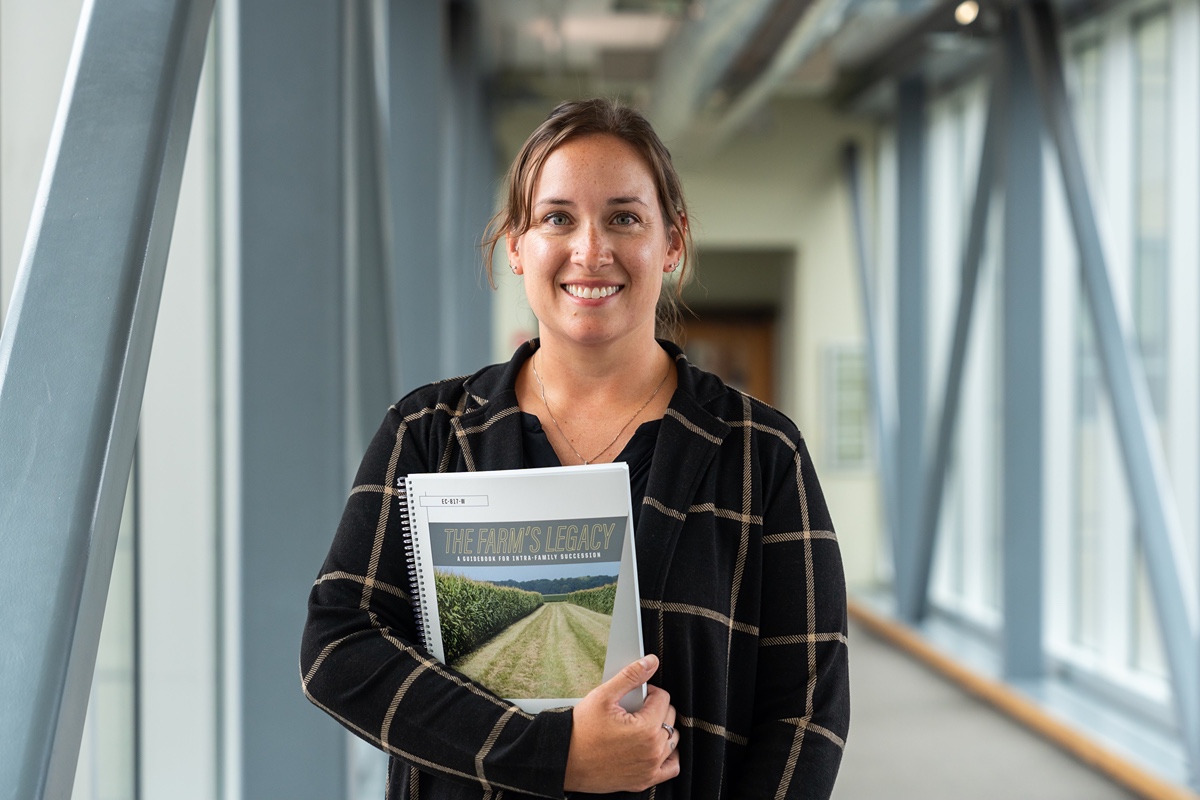Behind the Research: Renee Wiatt
About the feature
Many people are involved in the remarkable range of programs, services and facilities that undergird research in the College of Agriculture. Collectively they’re integral to the college fulfilling its research mission. “Behind the Research” explores their individual roles. Each academic year, we profile six people whose work supports the College of Agriculture’s global reputation for developing innovative, multidisciplinary solutions to challenges and then putting those solutions into action.
Renee Wiatt, family business management specialist for the Purdue Institute for Family Business; and research and Extension specialist for the North Central Regional Center for Rural Development
- Has been a key part of starting and growing the Purdue Institute for Family Business, a center for research, publications and outreach in the Department of Agricultural Economics.
- Led coordination and development of The Farm’s Legacy: A Guidebook for Intra-Family Succession, a comprehensive workbook distributed to farm families in Indiana and nationally.
- Using a 2022 AgSEED grant, designed a survey to collect quantitative data as a baseline in addition to qualitative data to explore the “whys” of farm succession.
The two sides of Renee Wiatt’s split appointment in agricultural economics are closely integrated. “The research and extension go hand in hand,” she says. “We like to have evidence-based research that we can translate into the field.”
Wiatt is back in her home department, having earned bachelor’s and master’s degrees in agricultural economics at Purdue. After working at Iowa State University, she started her career with Purdue Extension as an agriculture and natural resources educator in Montgomery County.
Wiatt came to the Purdue Institute for Family Business in 2016. Her position was split in 2020, when Purdue acquired the North Central Regional Center for Rural Development. She reports to and works closely with Maria Marshall, the James and Lois Ackerman Professor of Agricultural Economics and director of both the institute and NCRCRD.
Wiatt’s position with the institute focuses on research and extension to strengthen the resilience of farms, small businesses and family businesses, from business planning to succession planning and everything in between.
The data she collects for the institute is used by family business researchers across the country, and she is currently leading data collection focused on small businesses in the North Central Region for NCRCRD. “We’ve been lucky enough to acquire some good data, and we’ve been able to use that in a lot of papers,” she says.
Wiatt has been the lead and co-author on research and extension publications and has published eight journal articles. She also is part of two multistate research groups, one focused on resilient businesses and communities and the other on rural healthcare and business.
Using a 2022 AgSEED grant, Marshall and Wiatt surveyed two or more generations of farmers in the North Central region to learn what guidance and tools they needed for succession planning and farm transfer.
“That is helping us now when we’re looking at why succession is so hard,” Wiatt says. “Why do we keep getting stuck? Why is this farmland being sold off to developers instead of staying in the family? That survey has really opened our eyes to some of the ‘whys.’”
Wiatt and Marshall spoke about how the survey helped them understand generational differences within family businesses on a recent three-part podcast produced by the agricultural economics department.
Wiatt applies that same research when she leads Extension programming statewide. “Everybody knows that succession planning is an issue, but honestly, I love working with and in succession planning,” she says. “I love talking to farmers. I love figuring out on the research side the why to things aren’t moving.”
While families often think legal and tax implications are barriers, Wiatt says the senior generation’s reluctance to hand off management and decision-making is a more likely stumbling block. “My goal is to get people on the same page so that they can move forward,” she says. “We have to figure out what tools to put in place to make it work.”
She calls this the most rewarding part of her job. “When you’re able to find a solution to get all generations communicating and see that farm stay in the family, it’s just beautiful to see. It’s almost magical how it works out sometimes.”
Last summer Wiatt received training in heirs’ property — family-owned property that multiple generations inherit without the formal legal proceedings that prove ownership. “Basically you can’t clear title for a property to pass down from generation through generation,” she explains. “It holds up everything, including taxes, and if it falls behind on taxes or goes to auction, it’s easier for land grabbers to go in.”
This year, Wiatt and two colleagues from the University of North Carolina and Mississippi State University are working on a succession planning curriculum for people trained in heirs’ property to prevent such issues.
Her wide range of professional responsibilities have something in common. “All parts of my current position somehow incorporate research — interdisciplinary, if possible. All of my programs, workshops, and Extension and scholarly publications integrate research,” she says.
“This not only adds credibility to the work being done, but it ensures that farm and family businesses are receiving information backed by science that is relevant to them.”







